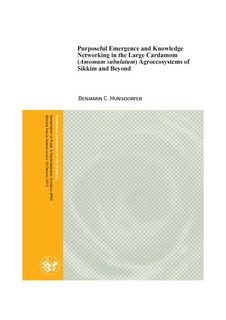Purposeful emergence and knowledge networking in the large cardamom (Amomum subulatum) agroecosystems of Sikkim and beyond
Master thesis
Permanent lenke
http://hdl.handle.net/11250/189627Utgivelsesdato
2014-02-11Metadata
Vis full innførselSamlinger
- Master's theses (IPM) [204]
Sammendrag
In human activity systems, systemic resilience arises as a result of the causal relationships between its intrinsic structure (organizational boundary) and the functional interconnectivity among actors within it (communication) through a process of collective inquiry over time. In traditional agricultural communities farmers often find themselves ill equipped when it comes to finding effective innovations on their own to deal with extrinsic pressures on a crop or practice. Conversely, scientific results yielded through controlled experiments may make broad claims and fail to account for the intricate socio-ecological and economic context the farmer is facing. Rather, inquiring into complex, systemic issues in agroecosystems requires a more comprehensive, holistic approach. A trans-disciplinary convergence of knowledge, perspectives and resources from actors at each stage in the value chain could help build innovation capacity and bring socioeconomic and ecological resilience to the system.
Large cardamom (Amomum subulatum) is a rare and endemic spice crop which has played an important role in the shaping of rural livelihoods and land use practices in the middle hills of Sikkim, India. In the past 10 years, the crop has experienced a decrease in production and productivity due to a chain of factors; many plants have become compromised due to continuous vegetative propagation and increased age; irregular seasonal rainfall and the effects of climate change have increased the spread of diseases and pests. The loss of large cardamom cultivation practices brings with it a host of interconnected issues, including a change in land use patterns, a loss of genetic biodiversity, family members seeking income from external sources, rural to urban youth migration, and ultimately the loss of traditional knowledge systems in Sikkim. Fortunately, society has responded through the ongoing efforts of different government and non-governmental agents whose objectives across the board seem genuinely concerned with improving the situation for rural livelihoods. A great deal of knowledge has been developed through traditional practices of large cardamom cultivation as well as through scientific research and developments. However, convergences among and between the various stakeholders within the large cardamom knowledge network are limited, and where interaction does take place it takes the linear form of training rather than a process of mutual understanding between farmers, scientists, and policymakers.
In my experiential learning process, I took on the roles of an action researcher seeking to facilitate convergences within the large cardamom system, and of a reflective practitioner seeking to improve the way I go about facilitating convergences within the system. As an action researcher, I involved a group of active stakeholders in a series of three successive workshops, through which we collectively identified root issues, drivers, and key actors in the large cardamom system, visualized gaps in the current structure for knowledge generation and sharing, envisioned a desired future for the large cardamom system, and developed a strategic action plan based on a real convergence of knowledge and resources of different stakeholder constituencies. Additionally, the specific case study on the complex issues surrounding large cardamom served as a window through which the larger opportunities and challenges towards a “sustainable Sikkim” could be collectively interpreted. As a reflective practitioner I was required to bring my own knowledge and experience into perspective, combining workshop results with the tools and techniques I have acquired in order to develop models for systemic improvement and identify limitations or assumptions I have about the world which affect and are affected by my practice as an action researcher.
